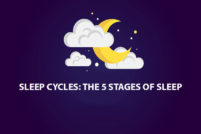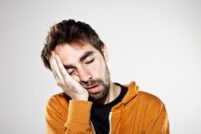Science still doesn’t have all the answers when it comes to REM, but the discoveries made over the years reveal just how mysterious and integral this stage of sleep is to our well-being.
From altered physiology to a potential role in the development of the human psyche: These facts about REM sleep prove just how amazing and indispensable it is.
1. REM is also known as “paradoxical sleep.”
REM sleep has also been coined “paradoxical sleep,” referring to the seemingly opposing processes taking place during this unique sleep phase.
While people are the most difficult to wake during this stage of sleep, their brain activity more closely resembles that of someone awake than asleep when compared to the other stages.
2. During REM, your eyes respond as if they are “looking” at things.
The rapid eye movements that give REM sleep its name are not random; they’re similar to the movements our eyes make when we are scanning a visual scene.
Studies have demonstrated that the movements of the eyes during REM are indicative of us scanning the “dream scene.” [1]
3. Even blind people move their eyes during REM sleep.
Congenitally blind people (those born without sight) still exhibit the scanning eye movements during REM.
These people don’t report having “visual” dreams, but their brains are being activated in a manner which mimics visual stimulation.
4. You are paralyzed during REM sleep.
While your brain is very active during REM sleep, the voluntary muscle of the body — your arms, legs, fingers and anything else under conscious control — are paralyzed. [2]
5. REM Sleep Behavior Disorder causes people to act out their dreams.
People with REM Sleep Behavior Disorder do not experience the paralysis along with their REM, which results in them acting out their dreams.
This disorder is believed to be caused by a malfunction in the brain stem, which results in issues regulating between believed to be caused by an issue with regulating between a state of waking, and that of REM. [3]
6. REM sleep comprises 20-25% of an adult’s total sleep time.
While REM sleep is so integral to our health, we only spend about ¼ of our total sleep time in it. The rest of the night we are cycling through the other four stages of sleep.
7. You have 3-5 phases of REM per night.
During a full night of sleep (7-8 hours), you’ll experience 3 to 5 phases of REM sleep.
8. REM sleep is essential for the development of the human brain.
While adults have a relatively low percent of REM sleep during a night, newborns spend almost their entire time asleep in this stage (80%).
Scientists have theorized that REM sleep plays an integral role in the maturation of the central nervous system and neuronal development. [4]
9. REM enhances creative thinking and problem-solving.
During REM our brains make new and useful associations between unrelated ideas — associations we may not make while conscious. [5]
This kind of abstract thinking is the key to creative problem-solving, and what leads to those “aha” moments upon waking.
10. Your blood pressure and heart rate increase during REM sleep.
During the other stages of sleep, your heart rate and blood pressure decrease. In contrast, REM is characterized by an increase in these physiological attributes.
11. Lack of REM sleep is linked to neurodegenerative disorders.
People with sleep disorders that reduce the amount of time they spend in REM sleep are at a higher risk for developing neurodegenerative disorders, such as Parkinson’s and Alzheimer’s.
A lack of REM may cause toxic proteins to build-up in the brain, and negatively impacts long-term memory storage in particular. [6]
12. Alcohol and recreational drugs can block REM sleep.
Both casual and chronic drinking have a significant effect on the neurotransmitters responsible for our sleep-wake cycle and regulating our sleep stages.
Alcohol causes both a decrease in total REM sleep percentage, as well as an increase in REM sleep latency (how long we are asleep before entering REM sleep). [7]
13. We can manipulate REM-sleep dreams.
We do dream during other stages of sleep than REM; however, there is something unique about the dreams we experience in REM that sets them apart.
REM sleep dreams tend to be more vivid — and we are more likely to recall them for this reason.
Lucid dreaming occurs during REM when one becomes aware they are dreaming and begins to make decisions about their actions and content of these dreams.
14. Thrashing/violent outbursts during REM sleep can be a warning sign.
There is evidence that thrashing around during REM sleep, and experiencing violent episodes as a result of dreams during this stage may be an early warning sign of neurological disorders: particularly Parkinson’s disease. [8]
15. REM sleep brain activation mimics wakefulness.
There is a group of neurons in the brainstem which is selectively active during REM sleep. These are a type known as “cholinergic neurons,” and they use the neurotransmitters acetylcholine. [9]
What’s bizarre is that acetylcholine systems are typically associated with being awake.
16. If we are awakened during REM sleep, we almost always remember dreaming.
Around 80% of adults will remember at least part of their dream if they are awakened from REM sleep, whereas waking for other stages where dreaming occurs rarely results in us remembering them.
This is the result of both how vivid REM dreams are compared to those in other stages of sleep, as well as the unique type of alertness during REM.
17. REM is intrinsic to learning and memory consolidation.
Scientists have found that during REM sleep our brain handles the information we have collected over the course of the previous day.
This activity lays down the foundation for acquiring the new information, forming associations and committing it to long-term memory. [10]
18. The brain is as active during REM sleep as when awake.
Unlike the other stages of sleep, which feature extremely slow brain waves we typically associate with the state of “sleeping,” the brain is extremely active during REM sleep.
19. The phases of REM get longer as morning approaches.
The first phase of REM occurs approximately 2-3 hours after you fall asleep and lasts only 10 minutes, but as morning approaches we cycle more quickly into REM sleep and can spend upwards of an hour at a time in it. [11]
20. REM sleep is required to feel “rested.”
Without the normal 3-5 cycles of REM during the night, you’re far less likely to feel well rested the next day.
It’s also far easier to wake up from REM, avoiding sleep inertia — a mental state characterized by brain fog when waking from slow-wave sleep. [12]
21. REM plays an important role in emotional regulation.
Studies have shown that REM sleep, and the dreams we have during it, may be an essential way in which we process and deal with emotional conflicts and difficult life events. [13]
A lack of REM sleep due to sleep disorders can result in issues with mood and emotional regulation, even the development of anxiety and depression.
22. A lack of REM results in the Rebound Effect.
REM sleep is so essential that our bodies have a built-in mechanism to make up for its loss:
After being deprived of REM sleep, we experience “REM rebound,” in which the length and frequency of REM periods throughout the night increase.
23. The energy consumed by the brain during REM equals or exceeds that of waking states.
While sleeping is restful, our actual energy consumption while asleep is not much lower than while awake. This is due to the overactivity of the brain, especially during REM sleep. [13]
At times the brain is even more active while in REM than it is during waking.
24. Children who don’t get enough REM have a greater likelihood of obesity.
Studies have shown that while getting 1 hour less of sleep was related to a 2x increase in the chance of being overweight, getting 1-hour less of REM sleep, in particular, was associated with a 3x increase. [14]
It’s believed that a lack of REM sleep affects the release of hormones, and may cause behavioral changes/influence behavior in a manner which increases emotional eating.
25. REM sleep snoring is different than during other stages.
Conventional snoring is more likely to take place during the other stages of sleep, and not at all during REM. So why do some people snore during REM?
Snoring during REM sleep is indicative of the sleep disorder sleep apnea. In fact, snoring associated with sleep apnea is most likely to occur during this stage of sleep. [15]
If you’re snoring during REM — if a partner tells you — it may be time to check in with your doctor.
From aiding in finding solutions to problems at work, to helping us cope emotionally, getting enough REM sleep is essential to your well-being.
Practicing sleep hygiene can help improve your sleep, and increase your time spent in REM.





